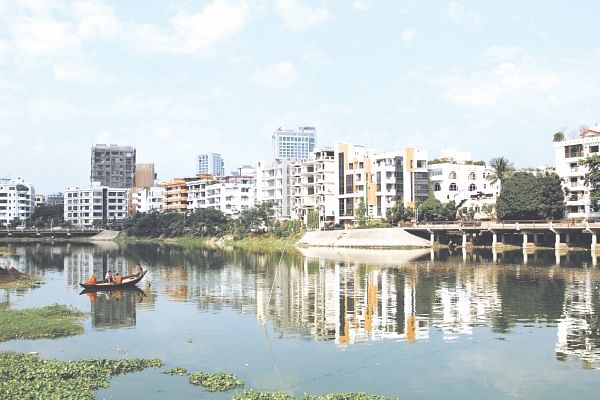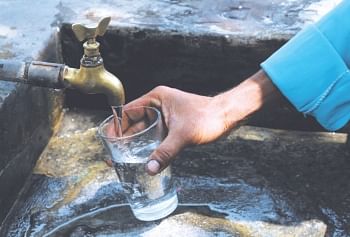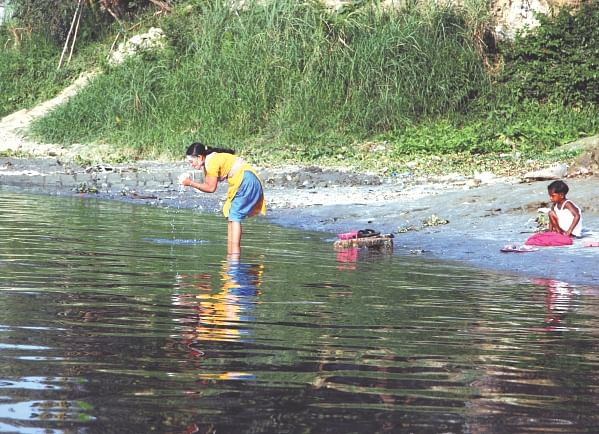| Home - Back Issues - The Team - Contact Us |
 |
| Volume 11 |Issue 22| June 01, 2012 | |
|
|
Law
Limiting the Right to Water The cabinet has recently approved a proposal to enact a law on water. If it is made into law, it will privatise water distribution in the rural areas, curbing people's basic right to safe water. Akram Hosen MAmun The parliament has yet to pass the draft bill, Bangladesh Water Act 2012, in the parliament. Under the provisions of the proposed Act, there are rooms for commercialising water resources which will effectively limit the citizen's right to natural water resources for household and agricultural use. Dr MA Matin, General Secretary of Bangladesh Poribesh Andolon (BAPA) says, "Through this act, people's right to water will be commercialised. It will be accorded to the ones who can afford to buy it." He thinks that the proposed law deals more with the distribution of water and privatisation of the natural resources than anything else. "Looking through the provisions of the proposed Water Act, it seems to me that Water Distribution Act would have been a far more appropriate title for the act," he says, adding that the rural communities have always used and managed the natural water resources without any major support from the government. "They have been getting free water for thousands of years. I don't see any reason why the government should intervene now with a water distribution act and attempt to commercialise an efficient natural system."
In the city, we get water from Water Supply and Sewerage Authority (WASA), which is a highly subsidised organisation. Matin informs that 1000 litres of water from WASA costs only Tk. 6. But since there is and will be no such subsidised government organisation in the villages to supply water, the businesses will have total control of water resources. "The consequences are not hard to imagine," he observes, “The companies will make profit by selling water to the people who are the actual owners of the water in the first place.” Similarly, Syeda Rizwana Hasan, Chief Executive of Bangladesh Environmental Lawyers Association (BELA) observes that the National Water Policy 1999 promises decentralisation of the management of water resources. "But the proposed Act does not provide any specific guideline for decentralisation, rather, its vague contours will centralise government's power on water resources." The law has provisions that may encourage businesses to invest in the distribution of water in the rural areas. "Inviting profit seeking businesses to invest in water distribution will harm poor people's basic right to water," she adds. The law needs to specify that when it comes to water supply, the involvement of profit seeking businesses must be limited to marketing bottled drinking water only. Rizwana Hasan also points out that the Act does not acknowledge people's traditional right to water. "Our national water policy emphasises on reducing our dependency on underground water, but most alarmingly, this proposed Act does not mention it at all." Pointing out another anomaly in the proposed Act, she says that although the draft mentions usage of natural water by people as a usual right, later on [16 (2)] the usage has been referred as a 'limited right'. It needs to be clarified. Matin and Rizwana agree that these inconsistencies in the bill will have the obvious effect of letting big businesses invest in water distribution and management in rural villages. However, the Water Resources Minister Ramesh Chandra Sen has little to say about anomalies in the draft. "In future, if we see that some of the provisions are harmful, we will just amend the law," he says, "Besides, since it has not been finalised yet, it is too early to judge." However, the minister does reassure the critics: "I welcome criticism, but I also think that our endeavours are praiseworthy." Talking about privatisation of water management, the minister says that there will be a committee to administer that. "The committee will have carefully selected members from the people who are running the country now," he says, adding, "We are working on to save the rivers. If we haven't been working so hard, you wouldn't get the amount of national food grains that you are getting now." Referring to himself as "an insignificant individual", he says, "It is because of people like me, who work with honesty and commitment that the water situation is improving in the country."
Although some of the provisions of this Act may seem unprecedented at first, there is a historical background of this Act. To give an example, Dr Matin says that in 2010, International Finance Corporation of the World Bank took permission from the government to set up 50 water plants in the rural areas of Bangladesh where they would use underground or surface water and would sell the water to villagers. It was supposed to involve two business groups: one from India and another from Bangladesh. The rationale behind such a venture was that the villagers, who apparently didn't get sufficient amount of safe water, would get a steady supply of safe drinking water from these companies. The companies were also given the legal right to control and manage all the water bodies, wetlands, well, tube-well and ponds in the villages. They planned to take all the water, make them safe for drinking in the plants, and supply to the villagers through pipes. "The proposal is so ridiculous that it defies serious comments. People with even the most superficial knowledge of the rural areas of Bangladesh will understand the environmental damages that the plants will cause," says Matin. He also informs that if the companies failed to set up water pipes in the village, they had the right to manufacture bottled drinking water and sell them to the villagers. "What it actually means is that the people who have tube-well, well or ponds in that area will have to buy bottled water to drink, because they will no longer have access to their own water sources," he says. Many similar projects have already been designed and implemented in other countries like India, Indonesia and Philippines. But the projects have always met with tremendous resistance from the people of those countries, informs Rizwana Hasan. In Bangladesh, environmental groups have been protesting IFC's projects for the last two years. BAPA have repeatedly asked the World Bank not to fund any projects that makes room for privatisation of water resources. “They will not be able to privatise water without facing protests by common people,” observes Matin. At present, the government is responsible to provide arsenic-free, safe drinking water to the people of arsenic prone areas. Engineer M Inamul Haque, Chairman of Water Environment Institution points out that the proposed law does not say if the government will continue to have the responsibility after enacting the law. He also adds that the law omits the fact that the people of both cities and villages have a right on water by birth. "I think that the government should take the responsibility to at least provide free drinking water to every citizen," he says. According to Haque, Bangladesh Environment Act 2010 fails to protect water from pollution. "Considering that," he says, "the proposed Water Act should have an article to save water from pollution." The Water Resources Minister hopes to stop land grabbers by provisions of this law. But Dr. MA Matin begs to differ. "It is true that there are some provisions that emphasise on maintaining the natural integrity of our water bodies, but they are not specific," he says. He also comments that these provisions have been put in the draft to be praised by the media. In a similar vein, Inamul Haque goes on to point out that our major rivers dry out soon after monsoon every year, because the dams constructed by India do not let enough water come downstream. In winter, the rivers dry out because the water is being used to irrigate farm lands. The level of underground water has fallen further below. The remaining rivers have been subjected to so much pollution that the water has become incredibly toxic. Some of the rivers have died because the beds were encroached upon by land grabbers. Drying up of wetlands has caused permanent destruction of natural habitat of many of our local fishes. The hope that the proposed Act will become a step towards solving these problems is vain.
|
||||
Copyright
(R) thedailystar.net 2012 |


